Strictly Personal
Chrisland, parenting and our new society by Reuben Abati
Published
2 years agoon
The Lagos State government, following reports of an alleged “rape incident” involving an 11-year old female student of Chrisland Schools Lagos, and male pupils of the school, during a trip to the World School Games in Dubai (March 10 -13), promptly shut down the school, to investigate exactly what happened. A video was put into circulation showing the girl in a sex position, with one of the students watching and recording the bedroom scene. The public was shocked. Raw sex in a primary school, photographed and videoed and put into circulation! Matters got worse when the mother of the girl involved raised an alarm and made statements to the effect that the school, Chrisland, had failed in its duty to take care of her daughter while on a trip to Dubai, under its auspices; that on the return of the students, her daughter was taken for a pregnancy test without her consent, and that when the video became public, every attempt to engage with the school failed, and that the school had told her daughter not to say a word to anybody about her experience. Her daughter, she claimed, went to Dubai as a virgin, and returned in a sex video, traumatised, afraid to return to school.
I followed the story closely. The Lagos State government having shut down the school and its various branches warned the public to desist from sharing the video. Long before the state government reminded everyone that the circulation of pornography would attract a penalty of 14 years imprisonment, the video was already in circulation in any case, and many social media sites used it as click-bait. But what would any parent gain from a group of minors exploring adult experience? Many must have been motivated by sheer curiousity and the native belief that seeing is believing. The Lagos State government has now re-opened the Chrisland Schools, and the students are on their way back to the classroom in all the locations where the school has branches: Victoria Garden City where the incident occurred, Idimu, Ikeja, Festac, Lekki and elsewhere.
Chrisland is one of those well-appointed schools with a strong reputation and record of achievements, dating back to 40 years. The Awosikas, owners of the school, have through their educational system produced generations of students who have become established in many fields of human endeavour at home and abroad. In the absence of a functional public system, many parents patronise schools like Chrisland, which aspire to and maintain higher standards of instruction. Nigeria is a country where education is still valued in terms of the acquisition of certificates, observing the routine and the process to the letter. Even if a child is still going to end up as an internet fraudster or as a Boko Haram soldier, parents believe that a starting point is to give their children good education. This is more the case among the troubled Nigerian middle class, especially in the Southern parts of the country. Elsewhere, in other parts, the story is different. The North, for example, has the largest collection of out-of-school children. In parts of the East, the enrolment of the boy-child in trade apprenticeship schemes, by the way a global business model, continues to compete with enrolment in the formal school system.
This then makes it all the more surprising when it is reported, one case after another, that there are serious issues with the same schools that middle class parents and their wannabe colleagues patronise In the same Chrisland School in question, there was a report around 2019 about a male teacher who was said to have defiled a two-year-old. The man was convicted. In Abuja, there was also the case of a victim of sexual abuse, 14-year old Keren-Happuch Akpagher who died in one of the elite secondary schools – Premiere Academy, Lugbe. Before the latest incident in Chrisland, there was also the matter of Dowen College in Lekki, Lagos, in which 12-year old Sylvester Oromoni died. The Dowen College matter, still unresolved, with the family still protesting an attempt to sweep the matter under the carpet, was a big scandal. These are three of the reported cases of similar incidents in schools across Nigeria and in Lagos State. Many more of such incidents would go unreported, given the culture of silence that governs the Nigerian cultural and social space. Now, after the temporary closure of Chrisland Schools and police investigations, Chrisland has now been reopened by the Lagos authorities. The Police and the Lagos State government probably acted swiftly in order to prevent the ugliness of the Dowen College affair from re-occurring. To start with, I think, a review is necessary. In this country, we forget too soon, too easily. Things happen at such a frenetic pace, that we hardly have the time to reflect on what may have happened, before we move on to the next incident. Our present-mindedness, that is temporocentrism, is the biggest affliction that holds this country down.
I was struck by three major reactions to the pre-teenage sex scandal of the Chrisland students. Tonto Dikeh, the star actress, was the first to raise the alarm. Having watched the video, she said she did not think this was a case of rape or sexual violence, and that this was not the child’s first sexual encounter. She actually surmised that the girl must have had sex at least five times and that there must be an adult somewhere who exposed her quite early. I am tempted to believe Tonto Dikeh. She is a mature, experienced woman of multiple talents. I am therefore not in a position to doubt her ability to read this sort of situation and put a date and a stamp to it. But her more cogent point is that parents need to pay more attention to their children. The second reaction came from Shola Ogudu, the mother of Ayo Balogun’s first son, Boluwatife. Ayo Balogun is the superstar musician known popularly known as “Whizkid or Star Boy.” Ms Ogudu, in a statement, disclosed that her son attends the school in question and that she accompanied him to Dubai for the World School Games. There were 76 students from Chrisland and, incidentally, the school won about 34 medals which no one has bothered to talk about!
Ms Ogudu indicated that there was no way she could have allowed her son to travel alone to a foreign country, in the midst of 76 children and others! She advised parents to be more attentive, and devote more time to their children. Unlike the aggrieved mother in the story, Ms Ogudu was full of praise and support for Chrisland Schools. The third reaction that caught my attention was the statement by more than one psychologist that both the girl in the video and her parents need psychological counseling. And I ask: How about the boys too? What kind of 11-year old male child starts having sex so early? What kind of homes are these characters from? I have heard some people arguing that parents do not have time. Schools and teachers are expected to act in loco-parentis. This is where the problem lies.
In our time, growing up, our parents were hands-on guardians, coaches and advisers. They drummed values into our ears at every turn. Each time you tried to venture out of the house, to attend an event or return to school, you would be told: “Remember the child of whom you are.” This had nothing to do with money but everything about values, character, dignity and integrity. But in the new society in which we have found ourselves, many parents have abdicated their responsibilities. They claim that they are busy looking for money to meet everyone’s needs. In the course of that pursuit, a child is handed over straight from the maternity ward to a retinue of nannies, home assistants and aides. In our new society, we throw money at everything including our children. Daddy has no time. Mummy is too busy trying to compete with the Joneses. The children are given all the toys that they want – from TV, to Play station to 24-hour electricity supply. These uptown babies of the new society do not cry. As Max Romeo and the Upsetters put it: “They don’t know what hungry is like/Uptown babies don’t cry/They don’t know what suffering is like/They have Mummy and Daddy/Lots of toys to play with/Nanny and Granny/Lot of friends to stay with…”
As soon as they are old enough to press numbers, they get a sleek, smart phone – usually the costliest in the market, with unrestricted access to social media. Some parents even open instagram and TikTok accounts for their children as soon they start crawling. This Gen Z group is soon introduced to all the negative stuff that social media can offer. Even outside that space, they are exposed to the dissolute lives of their parents: twerking moms; violent, 12 o’clock dads; and a community of sick uncles and aunties who set very bad examples. There are many households out there in which parents and their children are strangers to one another. When the children then fail in school, morally and academically, the same parents blame the teachers. They claim that they have paid so much money so that their children can get the best training possible. The truth of the matter is that money cannot buy everything. There are just certain things money can’t buy. Many parents themselves are in need of parenting! What do you make, for example, of those overgrown babies who wake up in the morning, eat spaghetti and spend the rest of the day playing games in front of the TV. They don’t have to work: their own parents have made enough money to feed the next five generations of idle sons and daughters! These idlers father children and the cycle continues.
It seems to me that all cases of reported misdemeanour in our schools should trigger introspection in every right-thinking, concerned stakeholder. The problem is not that of Chrisland Schools. It is an indication of the deepening moral turpitude in our land. Everything that can go wrong is wrong with the younger generation: juvenile delinquency, drug abuse, value system collapse, cultism, the kind of music they listen to – there is even a Naira Marley Gang – you don’t want me to describe the sociology of that. Adolescent sexuality is on the rise, with promiscuity now the order of the day. Aristotle told us that “a child learns by imitation”. Nigeria has taught its children bad imitation, and that is why the children replicate the bad behaviour of their parents. It is beyond the schools. After all, one Christian university in this same country once decided that it would conduct compulsory virginity tests on its new female students. Many of us complained at the time that this was discriminatory and gender insensitive. The school authorities stood their ground. After two sessions, they didn’t need to be persuaded to abandon the practice without any argument, when they discovered that among the teenage female university entrants, a virginity test was no more than a futile search for a virgin in a maternity ward!
When incidents such as the one under review occur, processes are important. I hope that the Lagos State government and the Police would make their findings public. By deciding to re-open Chrisland Schools, both authorities must have made some findings and reached a conclusion that the school has no case to answer. Many parents are relieved. But the public has a right to know more. Parents in particular, need to know. There are also lessons to be learnt from how Chrisland Schools management has controlled the crisis and managed the communication process. They have done much better than the managers of Dowen College who practically slept off in the face of a crisis until things went out of hand. The team of crisis managers at Chrisland stayed on the matter and bombarded the public with their own version of the story before the alternative could gain ground. They had the support of other stakeholders who helped to intensify other aspects of the narrative, including detailed revelations about how the girl in question is an indulgent, over-pampered child with a reputation for sexual displays on social media and a wayward, bad-girl-attitude for which she is reportedly unapologetic!
Chrisland School has done a good job of rescuing and protecting its brand all through the storm. In a statement signed on behalf of the school by Akin Fadeyi, a member of the school’s Advisory Board, the school has in place a strong child protection mechanism. Going forward, the school must see the need to invest more in that mechanism, and constantly engage with parents to provide the best possible arrangements for students. Besides, Mrs Winifred Awosika needs to take a second look at the Victoria Garden City (VGC) branch of the School. It was in this same school three years ago, that a teacher was eventually sentenced to a prison term of 60 years for sexually abusing a two-year old. Is there something amiss in that school that needs to be addressed? Could it be the celebrity environment on the Island? Lagos State has more than 20 thousand schools – public and private, from the primary to the tertiary level. The government should strengthen the Inspectorate Division of its Ministry of Education to make it more efficient, vigilant, and productive for the good of all. To parents, a simple message: wake up!
Reuben Abati is a former presidential spokesperson, writes from Lagos.
You may like
-


This Sudan war is too senseless; time we ended it, By Tee Ngugi
-


Air Peace, capitalism and national interest, By Dakuku Peterside
-


This is chaos, not governance, and we must stop it, By Tee Ngugi
-


Off we go again with public shows, humbug and clowning, By Jenerali Uliwengu
-


How patriarchy underpins gender violence today, By Tee Ngugi
-


Help! There’s a dangerous, secret plot to save the EAC from imminent death, By Charles Onyango-Obbo
Strictly Personal
This Sudan war is too senseless; time we ended it, By Tee Ngugi
Published
22 hours agoon
April 28, 2024
Why are the Sudanese Armed Forces (SAF) and the paramilitary Rapid Support Forces (RPF) engaged in a vicious struggle? It is not that they have ideological, religious or cultural differences.
Not that people should fight because of these kinds of differences, but we live in a world where social constructions often lead to war and genocide. It is not that either side is fighting to protect democracy. Both sides were instruments of the rapacious dictatorship of Omar el-Bashir, who was overthrown in 2019.
Both are linked to the massacres in Darfur during Bashir’s rule that led to his indictment by the International Criminal Court for crimes against humanity. They both stood by as ordinary, unarmed people took to the streets and forced the removal of the Bashir regime.
None of these entities now fighting to the last Sudanese citizen has any moral authority or constitutional legitimacy to claim power. They both should have been disbanded or fundamentally reformed after the ouster of Bashir.
The SAF and the RSF are fighting to take over power and resources and continue the repression and plunder of the regime they had supported for so long. And, as you can see from news broadcasts, they are both well-versed in violence and plunder.
Since the fighting began in 2023, both sides have been accused of massacres that have left more than 30,000 people dead. Their fighting has displaced close to 10 million people. Their scramble for power has created Sudan’s worst hunger crisis in decades. Millions of refugees have fled into Chad, Ethiopia and South Sudan.
The three countries are dubious places of refuge. Chad is a poor country because of misrule. It also experiences jihadist violence. Ethiopia is still simmering with tensions after a deadly inter-ethnic war.
And South Sudan has never recovered from a deadly ethnic competition for power and resources. African refugees fleeing to countries from which refugees recently fled or continue to flee sums up Africa’s unending crisis of governance.
Africa will continue to suffer these kinds of power struggles, state failure and breakdown of constitutional order until we take strengthening and depersonalising our institutions as a life and death issue. These institutions anchor constitutional order and democratic process.
Strong independent institutions would ensure the continuity of the constitutional order after the president leaves office. As it is, presidents systematically weaken institutions by putting sycophants and incompetent morons in charge. Thus when he leaves office by way of death, ouster or retirement, there is institutional collapse leading to chaos, power struggles and violence. The African Union pretends crises such as the one in Sudan are unfortunate abnormally. However, they are systemic and predictable. Corrupt dictatorships end in chaos and violence.
Tee Ngugi is a Nairobi-based political commentator.
Strictly Personal
Air Peace, capitalism and national interest, By Dakuku Peterside
Published
2 weeks agoon
April 16, 2024
Nigerian corporate influence and that of the West continue to collide. The rationale is straightforward: whereas corporate activity in Europe and America is part of their larger local and foreign policy engagement, privately owned enterprises in Nigeria or commercial interests are not part of Nigeria’s foreign policy ecosystem, neither is there a strong culture of government support for privately owned enterprises’ expansion locally and internationally.
The relationship between Nigerian businesses and foreign policy is important to the national interest. When backing domestic Nigerian companies to compete on a worldwide scale, the government should see it as a lever to drive foreign policy, and national strategic interest, promote trade, enhance national security considerations, and minimize distortion in the domestic market as the foreign airlines were doing, boost GDP, create employment opportunities, and optimize corporate returns for the firms.
Admitted nations do not always interfere directly in their companies’ business and commercial dealings, and there are always exceptions. I can cite two areas of exception: military sales by companies because of their strategic implications and are, therefore, part of foreign and diplomatic policy and processes. The second is where the products or routes of a company have implications for foreign policy. Air Peace falls into the second category in the Lagos – London route.
Two events demonstrate an emerging trend that, if not checked, will disincentivize Nigerian firms from competing in the global marketplace. There are other notable examples, but I am using these two examples because they are very recent and ongoing, and they are typological representations of the need for Nigerian government backing and support for local companies that are playing in a very competitive international market dominated by big foreign companies whose governments are using all forms of foreign policies and diplomacy to support and sustain.
The first is Air Peace. It is the only Nigerian-owned aviation company playing globally and checkmating the dominance of foreign airlines. The most recent advance is the commencement of flights on the Lagos – London route. In Nigeria, foreign airlines are well-established and accustomed to a lack of rivalry, yet a free-market economy depends on the existence of competition. Nigeria has significantly larger airline profits per passenger than other comparable African nations. Insufficient competition has resulted in high ticket costs and poor service quality. It is precisely this jinx that Air Peace is attempting to break.
On March 30, 2024, Air Peace reciprocated the lopsided Bilateral Air Service Agreement, BASA, between Nigeria and the United Kingdom when the local airline began direct flight operations from Lagos to Gatwick Airport in London. This elicited several reactions from foreign airlines backed by their various sovereigns because of their strategic interest. A critical response is the commencement of a price war. Before the Air Peace entry, the price of international flight tickets on the Lagos-London route had soared to as much as N3.5 million for the economy ticket. However, after Air Peace introduced a return economy class ticket priced at N1.2 million, foreign carriers like British Airways, Virgin Atlantic, and Qatar Airways reduced their fares significantly to remain competitive.
In a price war, there is little the government can do. In an open-market competitive situation such as this, our government must not act in a manner that suggests it is antagonistic to foreign players and competitors. There must be an appearance of a level playing field. However, government owes Air Peace protection against foreign competitors backed by their home governments. This is in the overall interest of the Nigerian consumer of goods and services. Competition history in the airspace works where the Consumer Protection Authority in the host country is active. This is almost absent in Nigeria and it is a reason why foreign airlines have been arbitrary in pricing their tickets. Nigerian consumers are often at the mercy of these foreign firms who lack any vista of patriotism and are more inclined to protect the national interest of their governments and countries.
It would not be too much to expect Nigerian companies playing globally to benefit from the protection of the Nigerian government to limit influence peddling by foreign-owned companies. The success of Air Peace should enable a more competitive and sustainable market, allowing domestic players to grow their network and propel Nigeria to the forefront of international aviation.
The second is Proforce, a Nigerian-owned military hardware manufacturing firm active in Rwanda, Chad, Mali, Ghana, Niger, Burkina Faso, and South Sudan. Despite the growing capacity of Proforce in military hardware manufacturing, Nigeria entered two lopsided arrangements with two UAE firms to supply military equipment worth billions of dollars , respectively. Both deals are backed by the UAE government but executed by UAE firms.
These deals on a more extensive web are not unconnected with UAE’s national strategic interest. In pursuit of its strategic national interest, India is pushing Indian firms to supply military equipment to Nigeria. The Nigerian defence equipment market has seen weaker indigenous competitors driven out due to the combination of local manufacturers’ lack of competitive capacity and government patronage of Asian, European, and US firms in the defence equipment manufacturing sector. This is a misnomer and needs to be corrected.
Not only should our government be the primary customer of this firm if its products meet international standards, but it should also support and protect it from the harsh competitive realities of a challenging but strategic market directly linked to our national military procurement ecosystem. The ability to produce military hardware locally is significant to our defence strategy.
This firm and similar companies playing in this strategic defence area must be considered strategic and have a considerable place in Nigeria’s foreign policy calculations. Protecting Nigeria’s interests is the primary reason for our engagement in global diplomacy. The government must deliberately balance national interest with capacity and competence in military hardware purchases. It will not be too much to ask these foreign firms to partner with local companies so we can embed the technology transfer advantages.
Our government must create an environment that enables our local companies to compete globally and ply their trades in various countries. It should be part of the government’s overall economic, strategic growth agenda to identify areas or sectors in which Nigerian companies have a competitive advantage, especially in the sub-region and across Africa and support the companies in these sectors to advance and grow to dominate in the African region with a view to competing globally. Government support in the form of incentives such as competitive grants ,tax credit for consumers ,low-interest capital, patronage, G2G business, operational support, and diplomatic lobbying, amongst others, will alter the competitive landscape. Governments and key government agencies in the west retain the services of lobbying firms in pursuit of its strategic interest.
Nigerian firms’ competitiveness on a global scale can only be enhanced by the support of the Nigerian government. Foreign policy interests should be a key driver of Nigerian trade agreements. How does the Nigerian government support private companies to grow and compete globally? Is it intentionally mapping out growth areas and creating opportunities for Nigerian firms to maximize their potential? Is the government at the domestic level removing bottlenecks and impediments to private company growth, allowing a level playing field for these companies to compete with international companies?
Why is the government patronising foreign firms against local firms if their products are of similar value? Why are Nigerian consumers left to the hands of international companies in some sectors without the government actively supporting the growth of local firms to compete in those sectors? These questions merit honest answers. Nigerian national interest must be the driving factor for our foreign policies, which must cover the private sector, just as is the case with most developed countries. The new global capitalism is not a product of accident or chance; the government has choreographed and shaped it by using foreign policies to support and protect local firms competing globally. Nigeria must learn to do the same to build a strong economy with more jobs.
EDITOR’S PICK
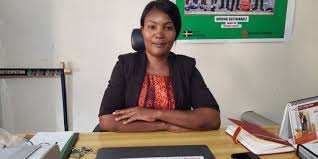

Conservationist, Kearns, names intolerance and digital media abuse as threats to media freedom
Nsama Kearns, the Executive Director of Care for Nature, speaks on the indispensable role of a free media in society....
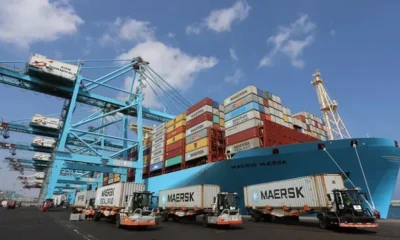

Nigeria gets $600 million investment from Danish firm Moller-Maersk
Nigeria’s presidency said on Sunday that President Bola Tinubu had secured an investment of $600 million from Danish shipping and...
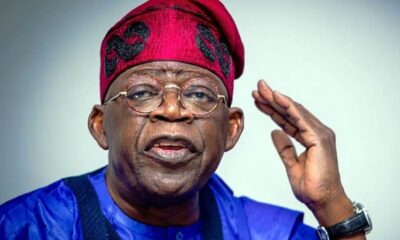

I saved Nigeria from bankruptcy by removing fuel subsidy— Tinubu
Nigerian President, Bola Tinubu, on Sunday, boasted that he saved Nigeria from going bankrupt by removing fuel subsidy on his...


Behind the News: All the backstories to our major news this week
Over the past week, there were lots of important stories from around the African continent, and we served you some...
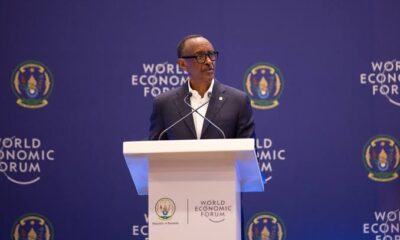

Video: How Rwanda is driving Ai revolution in Africa
In this video, the Managing Director of Rwanda’s Centre for the Fourth Industrial Revolution, Crystal Rugege, speaks on the country’s...


This Sudan war is too senseless; time we ended it, By Tee Ngugi
Why are the Sudanese Armed Forces (SAF) and the paramilitary Rapid Support Forces (RPF) engaged in a vicious struggle? It...
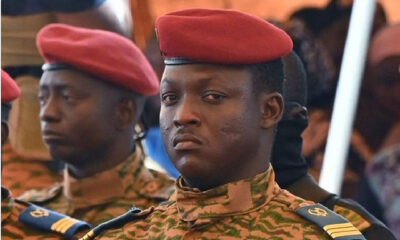

Burkina Faso investigating reports of northern killings
A government spokesman has revealed that Burkina Faso is looking into reports that 223 people were killed by the Burkinabe...


Nigeria: Bureaux De Change operators to harmonise retail FX market
Amidst the volatility around the Nigerian currency and its foreign exchange market, the Association of Bureaux De Change Operators in...


France willing to pay for Morocco’s 3GW power line to Western Sahara
Bruno Le Maire, the French finance minister, said on Friday that France was ready to help pay for a 3...
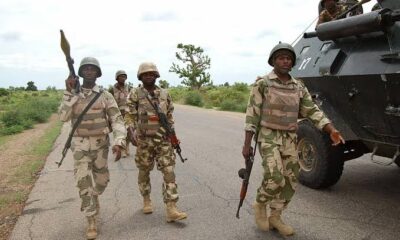

Nigerian troops neutralise 216 terrorists, arrest 332 in one week— Official
The Nigerian Army Defence Headquarters (DHQ) says troops from different operation theaters across the country neutralised 216 terrorists and arrested...
Trending
-

 Tech2 days ago
Tech2 days agoRepAir, Cella partner to launch carbon capture in Kenya
-

 Culture2 days ago
Culture2 days agoCollabo with Burna Boy enabled me buy house for my mum— Mozambican DJ Tarico
-

 Behind the News21 hours ago
Behind the News21 hours agoBehind the News: All the backstories to our major news this week
-

 Sports2 days ago
Sports2 days agoAl Ahly, Esperance to clash in CAF Champions League final


